- Home
- Jim Thompson
The Getaway Page 16
The Getaway Read online
Page 16
Very distinguished in white tie and tails, Doc McCoy stood on the promenade border of the great ballroom; beaming out over the swirling assemblage of dancers, bowing to this couple, smiling at that one, courteously inclining his head toward another. Perfectly groomed, his temples touched with gray, he was the very picture of a gentleman at ease, of well-bred charm. But he had seldom been less at ease, or more thoroughly miserable.
His physical discomfort—his numbed feet and aching back—was largely attributed to the wives of El Rey’s two chief justices. Neither of the ladies was over five feet tall, yet their combined weight was considerably more than a quarter of a ton. And they were as near to being inexhaustible as anyone Doc had ever met. He had danced with them by turns, murmuring exquisite apologies as they walked giggling on his feet, whispering compliments as his back screamed at the constant bending. Oh, he had buttered up the ladies, but good; for they were known to be ogres in private, and virtually the masters of their henpecked husbands. Then, while he was silently congratulating himself, he had seen Carol dance by in the arms of the chief of police. And he knew that his agonized efforts had been wasted. The chief of police against the chief justices; if there was any advantage, it was on Carol’s side. She might suffer for it, perhaps, if he became one of the dominion’s suicides or accident victims. But that would do him no good whatsoever.
It was now more than an hour since he had seen either her or the chief of police, and his anxiety was growing. He would have to think very fast, or this might well be the last grand ball he would ever attend.
He made a final survey of the ballroom. Then turning, apparently unseeing as a fat feminine hand waved to him across the throng; he strolled slowly down the palm-bordered promenade. And for some reason his mind went back to that long-ago day in Kansas; to the picnic grounds where he and Carol had gone after leaving the train.
“…need to get acquainted again, Doc. We just about have to!”
Doc smiled wryly to himself. Get acquainted? Oh no, they didn’t need to. What had actually troubled them was that they knew each other too well. They lived by taking what they wanted. By getting rid of anyone who got in their way or ceased to be useful to them. It was a fixed pattern with them; it was them. And in the event of a showdown, they would show no more mercy toward each other than they had toward so many others…
Wrapped in thought, Doc sauntered down the promenade, absently glancing through the doorways of the innumerable parlors, drawing rooms and bars. From one of them, fat Ike Moss called a muffled greeting to him; gestured, his mouth stuffed, to a long delicacy-laden table. But Doc smilingly shook his head, and passed on. Ike Moss, he thought distastefully. How gross, how completely lacking in a sense of propriety could the man be? Only last week his wife had drowned in her bath, yet here he was dressed to the nines, and gobbling down everything in sight.
Probably raided the icebox after he finished her off, Doc thought. And he chuckled silently at the picture that came into his mind.
He came to a small billiard room; started on past it. Then he paused abruptly, straightened his shoulders, and went through the doorway.
Dr. Max Vonderscheid was at the one pool table. His dwarfed hunchbacked body was dressed in rusty black, the tails of the ill-fitting suit almost touching the floor. And his gray leonine head rose only a few inches above the table. But still he appeared austerely handsome and dignified; and he sent the pool balls caroming about the green with almost magical accuracy.
He pocketed the last two with a difficult double-bank shot. Doc applauded lightly, and Vonderscheid set the cue on the floor butt down, and leaned on it looking at him. “Yes, Herr McCoy? I may be of service to you?”
His speech was almost unaccented; Doc had observed that it almost always was except when he was around El Rey. He and El Rey were seemingly on very good terms, the latter making extraordinary concessions to the doctor with regard to rent and other expenses. Still, Vonderscheid had to have some kind of income, and he couldn’t have much of a practice here.
“Yes?” There was a peculiar gleam in the hunchback’s eyes. “You cannot, perhaps, make up your mind?”
“Sorry,” Doc said hastily. “I was so absorbed in watching your game that—but, yes, I believe you can be of help to me. I, uh—the truth is I’m very worried about my wife. I don’t think she’s at all well.”
“I see. So?”
“Well—” Doc lowered his voice. “It’s of a highly confidential nature, Doctor. I’d want to discuss it in absolute privacy.”
Vonderscheid turned and glanced around the room, his gaze lingering for the merest moment on a palm-sheltered corner nook. Brows raised, he turned back to Doc again. “This would seem to be private enough,” he said. “Yes, this should do perfectly. So what is it about your wife, and why do you bring the matter to me?”
Doc began a cautious explanation. He had not nearly finished when Vonderscheid interrupted with an impatient gesture. “If you please, Herr McCoy! So much talk for so commonplace a deed! You want me to examine your wife, yes? To suggest that she would do well to have one, with no mention that it is your suggestion. And then you wish me to tell her that she is in need of an operation. To convince her of it. And during the course of the operation, I am to…”
“No point in spelling it out,” Doc said quickly. “After all, a great many people die in surgery. Now if you’d, uh, care to give me an estimate of your fee…”
“If I did it, there would be none. To remove either you or your wife from society would be both pleasure and privilege. Unfortunately I cannot do it. My name is Vonderscheid, not Katzenjammer. I am a doctor, not an assassin.”
“Now just a moment,” Doc frowned. “I’m afraid you misunderstood me, Doctor. You surely don’t think that I…”
“If you please!” Vonderscheid cut him off with a bang of a cue. “Do not ask me what I think of you or your wife, of what you have done with your good bodies, your strong minds, your unlimited opportunities. If only half so much I had had, or poor Rudy Torrento…”
“So that’s it,” Doc said, angrily sardonic. “You and Rudy were friends, so naturally…”
He broke off. Vonderscheid had moved back a step, stood gripping the cue with both hands. He wagged it with an ominous movement, and Doc discovered he had nothing more to say.
“You are quite through, McCoy?” The doctor grinned at him furiously. “Then I will finish. Rudy was my friend, yes. He was insane; he had been brutalized almost from birth; he had been made into what he was and he could not have been anything else. He had never had a friend, so I became one to him. I did not regard him as a criminal. No more, merely because I have broken laws, do I consider myself one. So! So that is all, Herr McCoy, except for two things. Your wife approached me only a few minutes ago with a proposition similar to your own. In fact, she should still be here,” he pointed to the cluster of potted palms. “So in case you should wish to condole with one another…”
He laughed wickedly, tossed his billiard cue onto the table and walked out.
Doc bit his lip. He remained where he was for a moment, and then, with a kind of dreary nonchalance, he walked around the table and skirted the palms.
Carol had a portable bar drawn up in front of her. Silently he sat down at her side, and silently she fixed him a drink, her eyes warmly sympathetic. “He was pretty rough on you, Doc. I’m sorry.”
“Oh, well,” Doc sighed. “I hope he wasn’t equally nasty with you, my dear.”
“I don’t care about myself. I’ve been told off by experts. But someone like you, someone that everyone has always liked…”
She gave his hand a soothing pat, and Doc turned to her with thoughtful wonderment. “Do you know,” he said, “I believe you really love me.”
“Love you?” she frowned. “Why, of course I do. Don’t you love me?”
“Yes,” Doc nodded slowly. “Yes, Carol, strangely enough I love you very much. I always have and I always will, and I could never love anyone else.”
“And I couldn’t either. I—oh, Doc. Doc!”
“And it doesn’t make any difference, does it, Carol? Or does it?”
“Does it?” She dabbed her eyes with her handkerchief. “T-tell me it does, Doc, and I’ll tell you it does. And what the hell difference will it make?”
Doc nodded vaguely. He refilled their glasses. In the palace tower a great bell began to toll the hour of twelve. And in the ballroom the band struck up the strains of Home Sweet Home.
“Well,” Carol said. “I guess it’s just about over, Doc.”
“Yes,” Doc said. “Just about over, Carol.”
“You!” she said, and her voice was suddenly angry, frightened, tortured. “I’ll drink a toast to you, Doc darling!”
“Why, how kind of you,” Doc said, and he touched his glass to hers. “What will it be!”
“To you! To you and our successful getaway!”
“And to you, my dear,” Doc said. “And another such victory.”
About the Author
James Meyers Thompson was born in Anadarko, Oklahoma, in 1906. In all, Jim Thompson wrote twenty-nine novels and two screenplays (for the Stanley Kubrick films The Killing and Paths of Glory). Films based on his novels include The Getaway, The Killer Inside Me, The Grifters, and After Dark, My Sweet.
…and Pop. 1280
In December 2011, Mulholland Books will publish Jim Thompson’s Pop. 1280. Follow is an excerpt from the novel’s opening pages.
Pop. 1280
Well, sir, I should have been sitting pretty, just about as pretty as a man could sit. Here I was, the high sheriff of Potts County, and I was drawing almost two thousand dollars a year—not to mention what I could pick up on the side. On top of that, I had free living quarters on the second floor of the courthouse, just as nice a place as a man could ask for; and it even had a bathroom so that I didn’t have to bathe in a washtub or tramp outside to a privy, like most folks in town did. I guess you could say that Kingdom Come was really here as far as I was concerned. I had it made, and it looked like I could go on having it made—being high sheriff of Potts County—as long as I minded my own business and didn’t arrest no one unless I just couldn’t get out of it and they didn’t amount to nothin’.
And yet I was worried. I had so many troubles that I was worried plumb sick.
I’d sit down to a meal of maybe half a dozen pork chops and a few fried eggs and a pan of hot biscuits with grits and gravy, and I couldn’t eat it. Not all of it. I’d start worrying about those problems of mine, and the next thing you knew I was getting up from the table with food still left on my plate.
It was the same way with sleeping. You might say I didn’t really get no sleep at all. I’d climb in bed, thinking this was one night I was bound to sleep, but I wouldn’t. It’d be maybe twenty or thirty minutes before I could doze off. And then, no more than eight or nine hours later, I’d wake up. Wide awake. And I couldn’t go back to sleep, frazzled and wore out as I was.
Well, sir, I was layin’ awake like that one night, tossing and turning and going plumb out of my mind, until finally I couldn’t stand it no longer. So I says to myself, “Nick,” I says, “Nick Corey, these problems of yours are driving you plumb out of your mind, so you better think of something fast. You better come to a decision, Nick Corey, or you’re gonna wish you had.”
So I thought and I thought, and then I thought some more. And finally I came to a decision.
I decided I didn’t know what the heck to do.
Books by Jim Thompson
After Dark, My Sweet
The Alcoholics
Bad Boy
The Criminal
Cropper’s Cabin
The Getaway
The Golden Gizmo
The Grifters
Heed the Thunder
A Hell of a Woman
The Killer Inside Me
The Kill-Off
The Nothing Man
Nothing More than Murder
Now and on Earth
Pop. 1280
Recoil
The Rip-Off
Savage Night
South of Heaven
A Swell-Looking Babe
Texas by the Tail
The Transgressors
Wild Town
Acclaim for Jim Thompson
“The best suspense writer going, bar none.”
—New York Times
“My favorite crime novelist—often imitated but never duplicated.”
—Stephen King
“If Raymond Chandler, Dashiell Hammett, and Cornell Woolrich would have joined together in some ungodly union and produced a literary offspring, Jim Thompson would be it.…His work casts a dazzling light on the human condition.”
—Washington Post
“Like Clint Eastwood’s pictures it’s the stuff for rednecks, truckers, failures, psychopaths and professors.…One of the finest American writers and the most frightening, Thompson is on best terms with the devil. Read Jim Thompson and take a tour of hell.”
—New Republic
“The master of the American groin-kick novel.”
—Vanity Fair
“The most hard-boiled of all the American writers of crime fiction.”
—Chicago Tribune
Copyright
The characters and events in this book are fictitious. Any similarity to real persons, living or dead, is coincidental and not intended by the author.
Copyright © 1958 by Jim Thompson, copyright © renewed 1986 by Alberta H. Thompson
Excerpt from Pop. 1280 copyright © 1964 by Jim Thompson, copyright © renewed 1992 by Alberta H. Thompson
Cover design by Julianna Lee, cover art: Getty Images. Cover copyright © 2011 by Hachette Book Group, Inc.
All rights reserved. In accordance with the US Copyright Act of 1976, the scanning, uploading, and electronic sharing of any part of this book without the permission of the publisher is unlawful piracy and theft of the author’s intellectual property. If you would like to use material from the book (other than for review purposes), prior written permission must be obtained by contacting the publisher at [email protected]. Thank you for your support of the author’s rights.
Mulholland Books / Little, Brown and Company
Hachette Book Group
237 Park Avenue, New York, NY 10017
www.mulhollandbooks.com/jimthompson
www.twitter.com/mulhollandbooks
www.facebook.com/mulhollandbooks
www.hachettebookgroup.com
First e-book edition, December 2011
The publisher is not responsible for websites (or their content) that are not owned by the publisher.
ISBN 978-0-316-19589-8

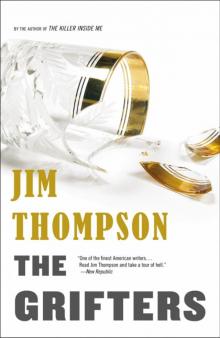 The Grifters
The Grifters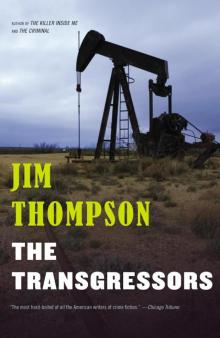 The Transgressors
The Transgressors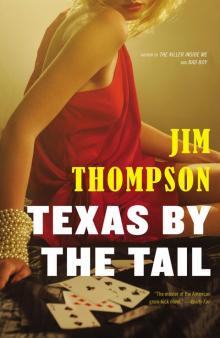 Texas by the Tail
Texas by the Tail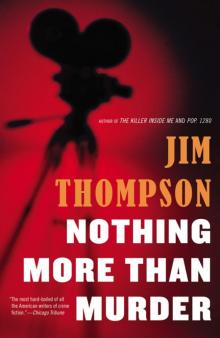 Nothing More Than Murder
Nothing More Than Murder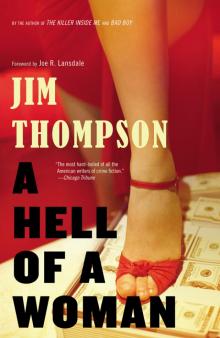 A Hell of a Woman
A Hell of a Woman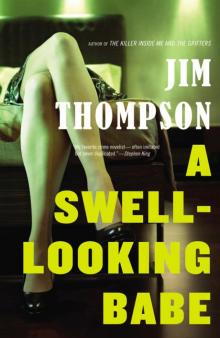 A Swell-Looking Babe
A Swell-Looking Babe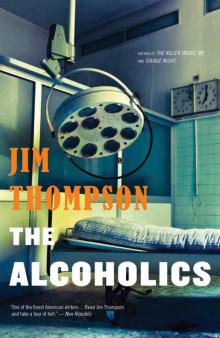 The Alcoholics
The Alcoholics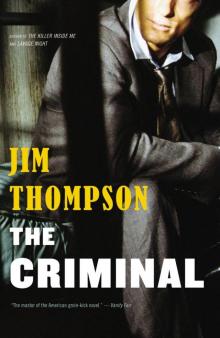 The Criminal
The Criminal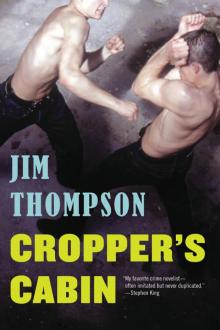 Cropper's Cabin
Cropper's Cabin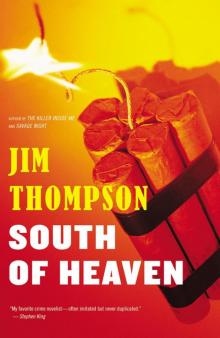 South of Heaven
South of Heaven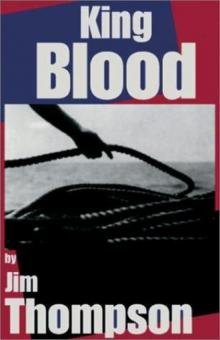 King Blood
King Blood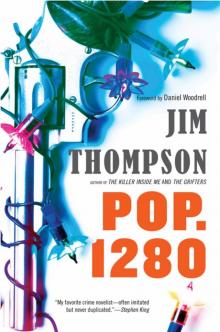 Pop. 1280
Pop. 1280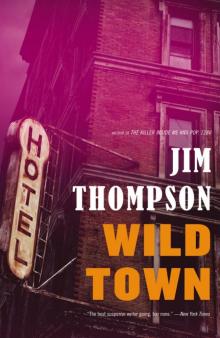 Wild Town
Wild Town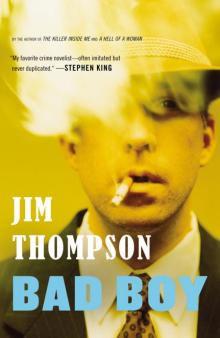 Bad Boy
Bad Boy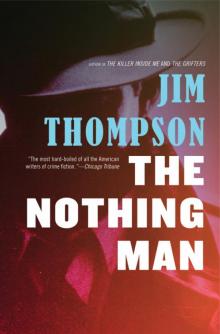 The Nothing Man
The Nothing Man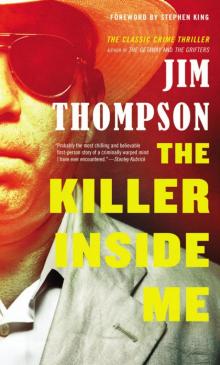 The Killer Inside Me
The Killer Inside Me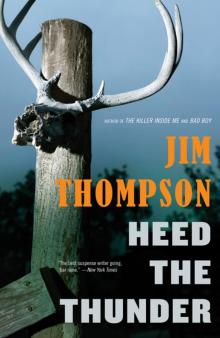 Heed the Thunder
Heed the Thunder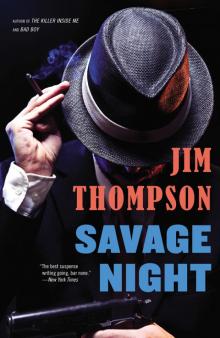 Savage Night
Savage Night Recoil
Recoil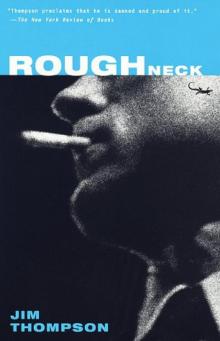 Roughneck
Roughneck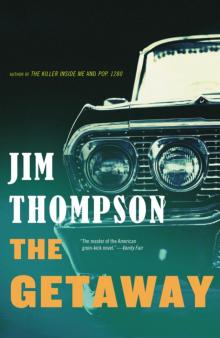 The Getaway
The Getaway